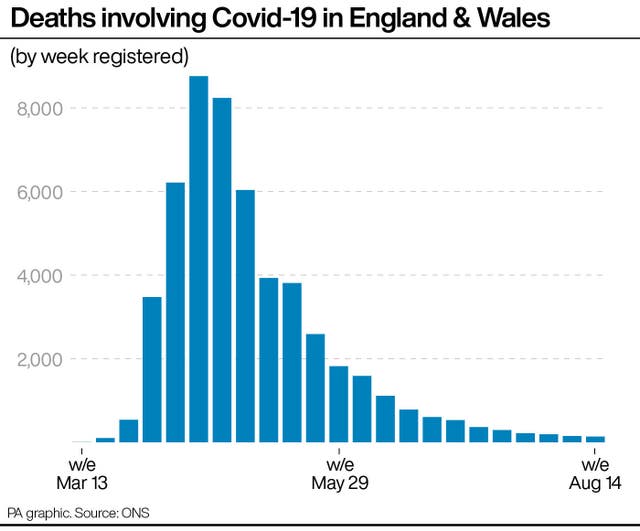UK deaths above average for first time since June after heatwave – ONS
There were 9,392 deaths from all causes in England and Wales in the week ending August 14.

Deaths in the UK have risen above average for the first time since mid-June, statistics show, but coronavirus is not thought to be behind the rise.
The heatwave experienced during the week ending August 14 is likely to explain the weekly increase, the Office for National Statistics (ONS) said.
There were 9,392 deaths from all causes in England and Wales in the week ending August 14 – 447 more deaths compared with the previous week.

This took the number of deaths that week to 3.4% above the average for this time of year over the past five years – the first time the average has been exceeded since June 12.
Meanwhile, deaths involving coronavirus have been steadily falling.
There were 139 deaths registered in the week ending August 14 that mentioned “novel coronavirus”, an 8.6% fall from the 152 deaths in the previous week.
It is the lowest number of weekly deaths involving Covid-19 registered since the week ending March 20, before the lockdown.

Overall, there were 10,580 deaths from all causes registered across the UK in the week ending August 14 – 265 deaths higher than the five-year average and 370 more deaths than the previous week.
England had the highest number of deaths involving Covid-19 with 125 deaths, followed by Wales with 14 deaths, Northern Ireland with four deaths and Scotland with three deaths.
Prof Hannah Cloke, professor of hydrology at the University of Reading, described the data as “truly extraordinary” and said: “While more research needs to be done to confirm this, it is very likely that the week-long heatwave that saw tropical nights and regular daytime temperatures above 35C killed hundreds of people.”
She added: “Heatwaves are one of the extremes of weather that are most closely linked to climate change. As the average temperature rises, potentially lethal extremes of heat in places like the UK and other densely populated regions will become more common.
“This heatwave tragedy reminds us of the cost in human lives, here in Britain, of the climate change emergency. Coming in the middle of a pandemic, it reminds us to ask ourselves, what is the value of human life? We have been willing to radically shift our economy to save people from a virus.
“The evidence is mounting up that we face more and more tragedies of this scale unless we take serious and fast long-term action on tackling climate change.”
The ONS said: “The rise in deaths between weeks 32 and 33 coincided with high temperatures in England and Wales, and heatwave warnings were issued by NHS England.
“The increased number of deaths, and the rise above the five-year average, were likely due to the heatwave; the coronavirus did not drive the increase, as deaths involving Covid-19 continued to decrease in week 33.”
Seven regions of England had deaths above the five-year average in the week ending August 14, the ONS said.
They were north-east England (11.1% above), the East Midlands (9.9% above), London (5.5% above), north-west England (5.2% above), south-west England (4.3% above), eastern England (1.4% above) and south-east England (1.3%).
In two regions the number of registered deaths was below the five-year average: the West Midlands (2.1% below) and Yorkshire & the Humber (2.2% below).
In Wales, the number of deaths registered in the week to August 14 was 9.4% above the five-year average.





